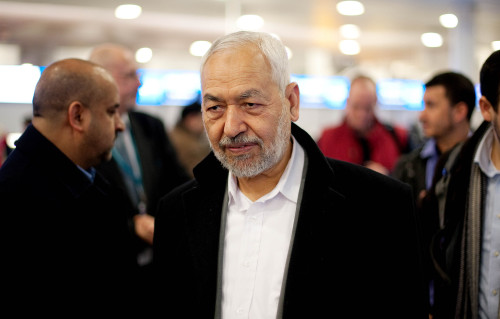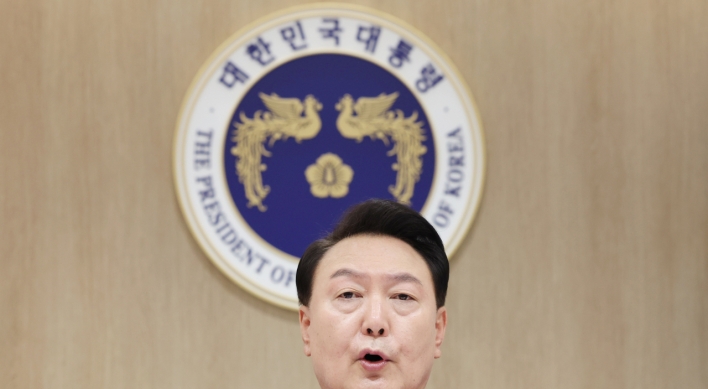Ghannouchi fled nation in 1987 after Ben Ali came to power in coup
TUNIS (AFP) ― Thousands turned out Sunday to welcome Tunisian Islamist leader Rached Ghannouchi’s return after more than 20 years in exile, as political Islam prepares a comeback following the fall of Tunisia’s regime.
“God is great!” Ghannouchi cried out, raising his arms in triumph as he walked into the arrivals hall of Tunis airport, with thousands of cheering supporters crowding around him, before driving off to visit his family.
The crowd intoned a religious song in honor of the Prophet Mohammed, as supporters held up olive branches, flowers and copies of the Koran.
“I am so happy to be bringing him back home. I never thought I would see my brother again alive in Tunisia,” his sister, Jamila, said.
There were also dozens of people protesting his arrival at the airport, holding up placards that warned against Islamic fundamentalism.
TUNIS (AFP) ― Thousands turned out Sunday to welcome Tunisian Islamist leader Rached Ghannouchi’s return after more than 20 years in exile, as political Islam prepares a comeback following the fall of Tunisia’s regime.
“God is great!” Ghannouchi cried out, raising his arms in triumph as he walked into the arrivals hall of Tunis airport, with thousands of cheering supporters crowding around him, before driving off to visit his family.
The crowd intoned a religious song in honor of the Prophet Mohammed, as supporters held up olive branches, flowers and copies of the Koran.
“I am so happy to be bringing him back home. I never thought I would see my brother again alive in Tunisia,” his sister, Jamila, said.
There were also dozens of people protesting his arrival at the airport, holding up placards that warned against Islamic fundamentalism.

The 69-year-old said he was elated as he checked in for his historic flight at London’s Gatwick airport, where he posed with a Tunisian flag and embraced relatives before boarding for a country that he had not seen since 1989.
“When I return home today I am returning to the Arab world as a whole,” he told reporters, adding that the popular Ennahda (Awakening) movement that he founded now planned to take part in Tunisia’s first democratic elections.
Experts say it is hard to gauge the strength of Islamism as a political force in Tunisia as it has been banned for decades but Islamists were Tunisia’s most powerful opposition force before persecution began in the early 1980s.
“There’s a lot more sentiment in his favor than most people realize.
They’re only going to be a player, not a dominant force,” George Joffe, a lecturer in international affairs at Cambridge University, said earlier.
The interim government installed in the north African state after the fall of president Zine El Abidine Ben Ali on January 14 has granted unprecedented freedoms and allowed key exiles to return despite the bans from the old regime.
Ghannouchi, a former radical preacher who says he now espouses moderate ideals similar to Turkey’s ruling Justice and Development Party, was persecuted in Tunisia ever since founding his Islamist movement in 1981.
He still officially has a life sentence hanging over his head for plotting against the president, although the new government has drawn up an amnesty law for convicted activists like Ghannouchi that now has to go before parliament.
In contrast to his preachings from the 1970s in which he condemned the rise of secular ideas in his homeland and the advances in women’s rights, Ghannouchi on Sunday said that Sharia Islamic law now had “no place in Tunisia”.
“It’s a great joy for us to be able to greet a comrade,” Abdel Fattah Mourou, one of the original members of Ennahda, said at the airport.
Najwa, a teacher who said she was imprisoned for wearing an Islamic veil, said: “Everything that’s said about him is lies... He’s a moderate Islamist.”
Mohammed Mahfoud, 37, a trade unionist, said: “I have come to pay homage.”
But the views on the streets of Tunis were far more critical of Ghannouchi.
“He has not said what he plans to do. He could cause trouble and destabilize the upcoming elections,” said Amenallah Darwish, a 29-year-old lawyer.
Some feminist groups are worried that Ghannouchi’s return may signal a rise in political Islam that could endanger their hard-won rights.
Hundreds of women rallied in the center of Tunis on the eve of Ghannouchi’s arrival, saying they would defend their rights against conservatives.
Asked about some of this concern on Sunday, Ghannouchi was dismissive.
“This fear is only based on ignorance,” he said, because Ben Ali’s regime had “worked to distort all its opponents, described them as terrorists or being against modernity. All of these allegations have no basis in reality.”
Ghannouchi fled Tunisia two years after Ben Ali came to power in a bloodless coup in 1987. In elections in 1989, which were heavily falsified, an Islamist-backed coalition still managed to win 17 percent of the vote.
Shortly after that, persecution of leading Islamists began and Ghannouchi went first to Algeria and then to Britain in 1991. Hundreds of Islamist activists who stayed behind were thrown into prison, often on flimsy charges.


















